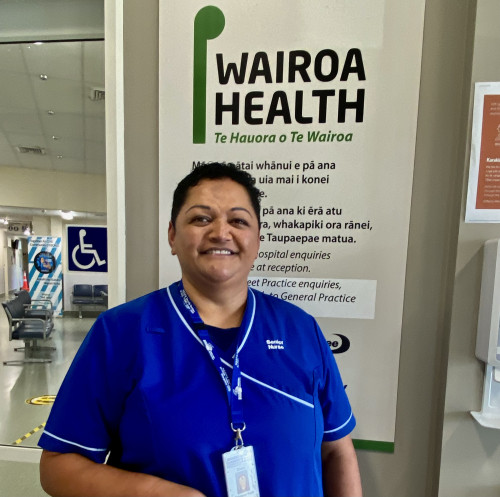
Working in a rural hospital can either “make you or break you”, says Wairoa Hospital Nurse Manager Dione Neri.
The Wairoa born-and-bred Registered Nurse says working rurally is a good option for nurses who are unsure which area to specialise in.
“You get everything in a rural area,” she says. “You get to know the patients well because it’s a small, tight-knit community and you work across the Emergency Department (ED) and ward patients during a shift.”
Having worked at Wairoa Hospital for 13 years, Dione says the supportive team is a highlight of rural nursing.
“We work very closely with the doctors and other services based here.”
In Wairoa, all primary and secondary health services are onsite, which improves the patient journey, she says.
“The accessibility for patients is easier,” she says. “If you have got a really unwell patient who presents to the general practice, you don’t have to call an ambulance; the patient is brought straight to ED, either by the doctor’s plinth or wheelchair.”
As the sole Nurse Manager at the hospital, Dione manages 35 staff across outpatients, district nursing, public health and midwifery, as well as allied health staff such as social workers and occupational therapists.
“It’s a big job and every day there are new challenges.”
The weather dependency of air transfer to Hastings or Tairawhiti can pose a challenge in rural areas like Wairoa, but the three districts worked closely together in the aftermath of Cyclone Gabrielle to ensure patients were well cared for.
“There was no access in and out of Wairoa via road so we had to rely on air transfers to Hastings or Tairawhiti.”
Post cyclone, Te Whatu Ora Hawke’s Bay and Tairawhiti also increased air transfers to and from Wairoa, and offered telehealth appointments. Some specialty services that Wairoa patients would normally have to travel for, were offered in Wairoa such as chemotherapy, facture liaison clinics, mental health and maternity visits.
As a Māori nurse, Dione believes cultural awareness is key to ensure care is delivered appropriately, particularly for many elder patients.
Communication and rapport are at the heart of ensuring this, she says.
“A patient might not want you to do their wash; they may prefer a family member. The importance is communication, and how we do it; and that’s true for a lot of things regarding nursing.”






Post your comment
Comments
No one has commented on this page yet.